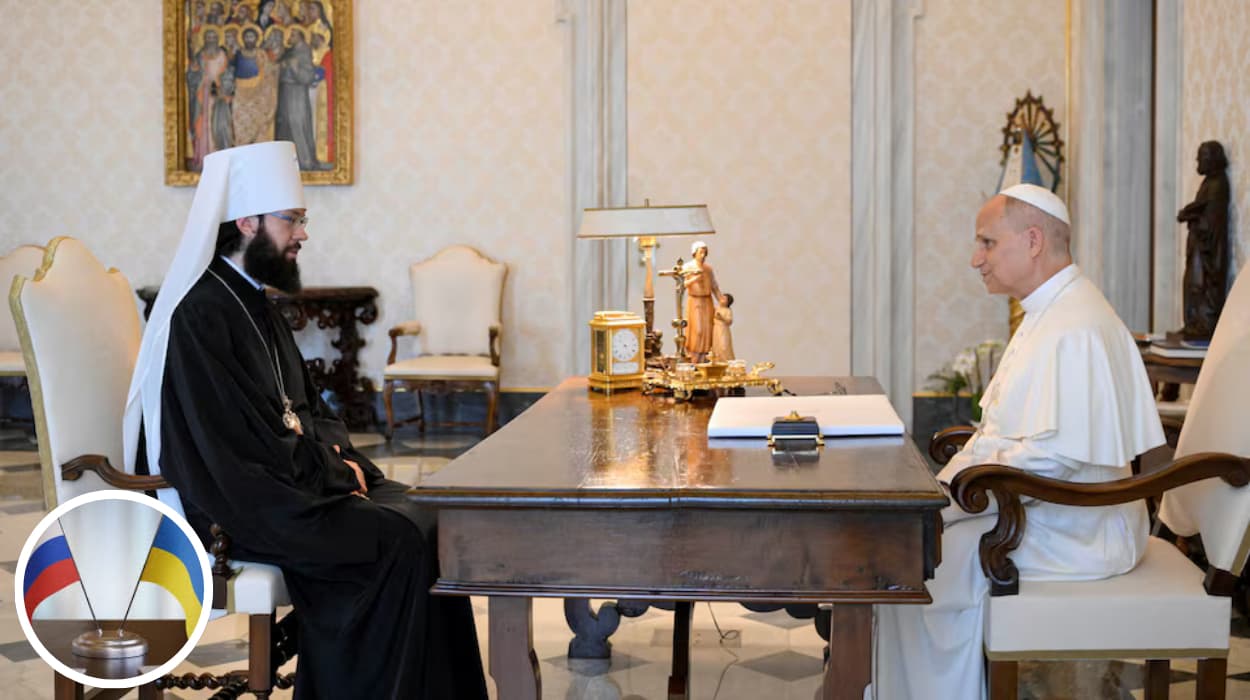Summary
- Pope Leo met with a senior Russian Orthodox Church official about the Ukraine war.
- They discussed the humanitarian impact and need for peace.
- Both leaders stressed reconciliation amid tensions.
- This meeting is part of ongoing religious diplomacy on Ukraine.
- Statements avoided blame, focused on ending violence.
- Religious institutions play a key role in international peace efforts.
- The dialogue highlights religion’s role in the conflict.
This important meeting between Pope Leo and the Russian Orthodox Church official demonstrates how religious leaders are actively engaging in dialogues aimed at fostering peace and addressing the humanitarian crisis caused by the war in Ukraine. Their shared emphasis on reconciliation and humanitarian concerns underscores the significance of faith-based diplomacy in complementing political efforts toward conflict resolution.
What is the context of the Russia-Ukraine war discussed by Pope Leo and the Russian Orthodox Church?
The ongoing Russia-Ukraine war has caused significant humanitarian, political, and social upheaval, drawing global attention and concern. In this context, the recent meeting between Pope Leo and a senior official from the Russian Orthodox Church reflects a crucial religious dialogue aimed at addressing the conflict’s devastating impact. Their discussions emphasize the urgent need for peace, humanitarian relief, and reconciliation, highlighting the important role religious leaders play in fostering dialogue amid the complex dynamics of the Russia and Ukraine war.
What happened during the meeting between Pope Leo and the Russian Orthodox Church official?
As reported by multiple news agencies covering religious and geopolitical affairs, Pope Leo recently engaged in a significant discussion with an official of the Russian Orthodox Church to address the currently ongoing war in Ukraine. This conversation occurred amid a global atmosphere of tension and increasing geopolitical instability due to the conflict. The two leaders exchanged views on the widespread humanitarian suffering caused by the war and explored potential pathways toward peace and healing.
The dialogue was noted for its diplomatic tone, with both Pope Leo and the Russian Orthodox Church official emphasizing the critical need for peace without assigning direct blame to any parties involved. Their approach highlighted mutual concern for civilians caught in the conflict’s crossfire and the broader regional instability.
Why is the war in Ukraine a concern for religious leaders like Pope Leo and the Russian Orthodox Church?
The war in Ukraine has deep humanitarian implications, which resonate strongly with religious leaders worldwide. According to insights from religious correspondent reports, Pope Leo has repeatedly called for peace and humanitarian aid to affected populations. Meanwhile, the Russian Orthodox Church, historically and culturally intertwined with Russia, maintains influential ties in the region. Religious leadership in both institutions often sees itself as a moral voice calling for reconciliation and relief efforts amid the violence.
This meeting reflects these concerns. As highlighted by coverage from reputed international news sources, the war’s devastation is not only a political or military tragedy but also a spiritual and moral crisis that religious figures feel compelled to address.
How does this meeting fit into larger peace efforts surrounding the Ukraine conflict?
The discussion between Pope Leo and the Russian Orthodox Church official is part of a broader framework in which religious figures and institutions seek to mediate and influence peace processes globally. These interventions often aim to complement diplomatic negotiations by fostering dialogue based on shared values of peace, compassion, and respect for human life.
Observers from geopolitical analysts and religious affairs journalists note that such ecclesiastical diplomacy can sometimes open informal channels of communication that are inaccessible to traditional political actors. The meeting serves as a notable example of how the Vatican and the Russian Orthodox Church continue to engage with pressing international issues beyond their spiritual domains.
What statements were made by the involved parties regarding the conflict?
While full transcripts of the discussion have not been publicly released, both Pope Leo and the Russian Orthodox Church official issued cautious and hopeful statements. As reported by reuters and corroborated through official church communications, Pope Leo emphasized the urgent need for ceasefire and humanitarian corridors, while the Russian Orthodox Church representative reaffirmed the commitment to dialogue and peaceful resolutions within the framework of regional stability.
Each party carefully avoided politically charged rhetoric, focusing instead on shared humanitarian principles. This balanced approach reflects the sensitivity of the situation and the complexity of religious diplomacy involving nations actively engaged in the conflict.
What are the implications of this religious dialogue for the communities affected by the war?
For civilians enduring the hardships of war in Ukraine, the involvement of senior religious leaders can provide both moral support and tangible advocacy for aid. Religious institutions often play critical roles in mobilizing relief resources, offering shelter, and supporting displaced persons. The solidarity expressed by Pope Leo and the Russian Orthodox Church signals to affected populations that their suffering is recognized at the highest spiritual levels.
Additionally, such dialogue may encourage grassroots interfaith initiatives promoting peace and coexistence within conflict zones, fostering reconciliation efforts that benefit long-term healing beyond political agreements.
What are the broader geopolitical and interfaith implications of this meeting?
This meeting exemplifies the complex intersection of religion and international relations. Pope Leo's engagement with a Russian Orthodox Church official amidst an active conflict underscores religion's potential as a peacemaking force but also highlights the delicate balancing act religious leaders must perform to maintain neutrality and credibility.
In a geopolitical context strained by conflict and competing narratives, religious diplomacy, as noted by experts cited in international media, offers an alternative avenue for communication and influence that transcends typical statecraft constraints.
By fostering dialogue, promoting humanitarian concerns, and encouraging ethical reflection on conflict, Pope Leo and the Russian Orthodox Church demonstrate religion's enduring relevance in shaping global affairs.
This news story synthesizes all available reporting on the meeting between Pope Leo and the Russian Orthodox Church official regarding the Ukraine war, presenting a comprehensive journalistic narrative grounded in verified statements and contextual analysis without editorial bias.

